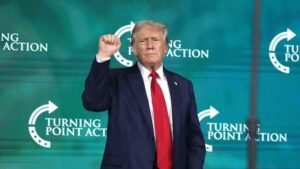
Donald Trump (AFP)
Donald Trump is the first Republican to secure a popular vote victory in the presidential contest since 2004. As such, he feels more confident than he did last time, and has stated that “America has given us an unprecedented and powerful mandate” to issue a wave of new policies through executive power once he takes office.
But he could be heading for a rude awakening, wrote Hayes Brown for MSNBC.
The fact is, he wrote, Trump’s popular vote win is one of the smallest in the history of modern elections — and while he enjoys a modicum of goodwill from voters now, that will quickly dissipate if he overreaches.
And as more votes have been counted, he wrote, Trump’s victory — now at 1.6 percent, versus President Joe Biden’s 4.5 percent win four years ago — looks less and less impressive: he “has not won a majority of the country’s votes, according to the most recent tally from NBC News. And much of the data available shows that Trump’s win likely had more to do with people opting to stay home this year than a massive swing in his favor.”
This should worry Trump, wrote Brown, because even presidents who entered office with far greater mandates have lost popularity rapidly when voters turned on their agenda: the U.S. electorate “will support the presidential candidate deemed most likely to represent change, only to move quickly to punish them for any sign of hubris,” he wrote.
“Every new administration since Clinton has seen its party hold a trifecta in Washington during its first year in office and claim a mandate to shake things up. It has not fared well in most instances.”
Bill Clinton and Barack Obama, for example, suffered wipeouts after controversial healthcare reform agendas, while George W. Bush’s second term was crippled early on by a groundswell of outrage over his effort to privatize Social Security.
And there are signs Trump is setting himself up for something similar. Pew Research “hasn’t found a massive surge in support for his policies,” wrote Brown, with only a bare 53 percent of voters open to his agenda, and even many of them turning against it when asked specific questions like on his immigration ideas.
Ultimately, wrote Brown, “The will of Donald Trump should never be confused for the will of all Americans.”


